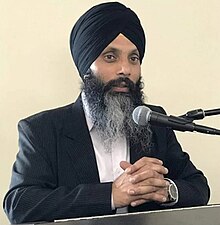Canadian Investigation into Hardeep Nijjar’s Death Compromised, Claims India’s High Commissioner to Canada
Mr. Verma emphasized that India has not been presented with concrete evidence by Canada or its allies to substantiate the alleged Indian involvement in Nijjar's death.
India’s High Commissioner to Canada, Sanjay Kumar Verma, has reaffirmed New Delhi’s position regarding the diplomatic dispute with Canada and called upon Ottawa to provide evidence supporting its allegations concerning the death of Hardeep Singh Nijjar.
Mr Verma conveyed these statements during an interview with the Canadian media outlet, The Globe and Mail, on Friday.
The developments followed Canadian Prime Minister Justin Trudeau’s assertion of the involvement of “agents of the Indian government” in Nijjar’s killing in June.
India promptly dismissed these allegations as “absurd and motivated” and responded by expelling a Canadian diplomat, escalating tensions between the two nations.
Mr. Verma emphasized that India has not been presented with concrete evidence by Canada or its allies to substantiate the alleged Indian involvement in Nijjar’s death.
He further implied that Prime Minister Trudeau’s public statements had adversely affected the ongoing Canadian police investigation into the incident.
“We have not received specific or pertinent information in this case that would enable us to cooperate with their investigation,” Mr. Verma stated.
“Where is the evidence? Where is the conclusion of the investigation? I would go a step further and assert that the investigation has already been compromised. It appears that a directive from a high-ranking authority has alleged India’s or Indian agents’ involvement,” The Globe and Mail quoted him as saying.
In an effort to ease strained relations, India has resumed visa services in Canada for four specific categories, after suspending these services in September with the notice of “further notice.”
Last month, Canada withdrew 41 diplomats from India, following New Delhi’s concerns over parity in diplomatic representation.
Similar stories














Comments are closed.